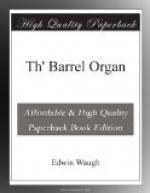Up from the valley came drowsy sounds that tell the
wane of day, and please the ear of evening as she
draws her curtains over the world. A woman’s
voice floated up from the pastures of an old farm-house,
below where I sat, calling the cattle home. The
barking of dogs sounded clear in different parts of
the vale, and about scattered hamlets, on the hill
sides. I could hear the far-off prattle of a
company of girls, mingled with the lazy joltings of
a cart, the occasional crack of a whip, and the surly
call of a driver to his horses, upon the high road,
half a mile below me. From a wooded slope, on
the opposite side of the valley, the crack of a gun
came, waking the echoes for a minute; and then all
seemed to sink into a deeper stillness than before,
and the dreamy surge of sound broke softer and softer
upon the shores of evening, as daylight sobered down.
High above the green valley, on both sides, the moorlands
stretched away in billowy wildernesses—dark,
bleak, and almost soundless, save where the wind harped
his wild anthem upon the heathery waste, and where
roaring streams filled the lonely cloughs with drowsy
uproar. It was a striking scene, and it was an
impressive hour. The bold, round, flat-topped
height of Musbury Tor stood gloomily proud, on the
opposite side, girdled off from the rest of the hills
by a green vale. The lofty outlines of Aviside
and Holcombe were glowing with the gorgeous hues of
a cloudless October sunset. Along those wild ridges
the soldiers of ancient Rome marched from Manchester
to Preston, when boars and wolves ranged the woods
and thickets of the Irwell valley. The stream
is now lined all the way with busy populations, and
evidences of great wealth and enterprise. But
the spot from which I looked down upon it was still
naturally wild. The hand of man had left no mark
there, except the grass-grown pack-horse road.
There was no sound nor sign of life immediately around
me.
The wind was cold, and daylight was dying down.
It was getting too near dark to go by the moor tops,
so I made off towards a cottage in the next clough,
where an old quarry-man lived, called “Jone o’Twilter’s.”
The pack-horse road led by the place. Once there,
I knew that I could spend a pleasant hour with the
old folk, and, after that, be directed by a short
cut down to the great highway in the valley, from whence
an hour’s walk would bring me near home.
I found the place easily, for I had been there in
summer. It was a substantial stone-built cottage,
or little farm-house, with mullioned windows.
A stone-seated porch, white-washed inside, shaded
the entrance; and there was a little barn and a shippon,
or cow-house attached. By the by, that word “shippon,”
must have been originally “sheep-pen.”
The house nestled deep in the clough, upon a shelf
of green land, near the moorland stream. On a
rude ornamental stone, above the threshold of the
porch, the date of the building was quaintly carved,
“1696,” with the initials, “J.




